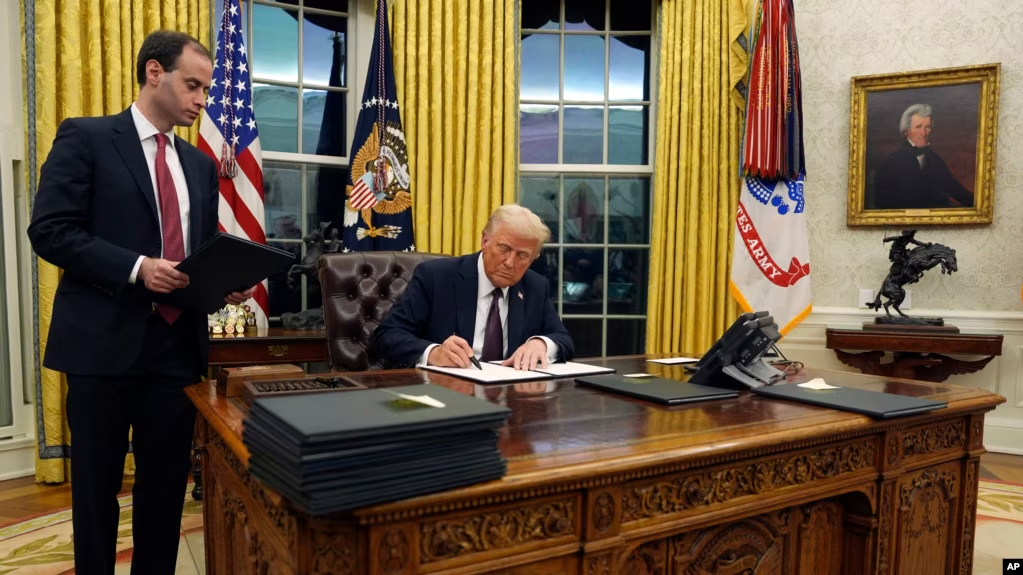
US Withdrawal from WHO and Paris Agreement Sparks Regret and Calls for Reversal
US Withdrawal from WHO and Paris Agreement Sparks Regret and Calls for Reversal
Geneva — United Nations agencies warn that the upcoming withdrawal of the U.S. from the World Health Organization and the Paris climate agreement will have significant repercussions for global health and initiatives aimed at mitigating climate change.
“The World Health Organization expresses its regret over the announcement that the United States plans to exit the organization,” the WHO stated on Tuesday in response to President Donald Trump’s announcement on Monday regarding his intention to leave the U.N. health agency.
“WHO plays an essential role in safeguarding the health and security of people around the globe, including those in the United States, by tackling the underlying causes of illness, strengthening health systems, and identifying, preventing, and addressing health emergencies such as disease outbreaks, frequently in challenging environments where others cannot operate,” it noted.
Keep reading
- Elon Musk Sparks Controversy with Back-to-Back Gestures at Inauguration Rally
- Al Khaleej vs. Al Nassr: Prediction and Preview for January 21, 2025
- Indian Shares Decline Amid Uncertainty Over Trump’s Tariff Plans
- Bollywood Star Saif Ali Khan Returns Home After Knife Attack by Intruder
In justifying his choice, Trump accused the organization of being influenced inappropriately by other member nations. “World Health has taken advantage of us; everyone takes advantage of the United States. That is not going to occur anymore,” he remarked while signing an executive order on Monday, just hours after his inauguration.
In addressing the claims, WHO spokesperson Tarik Jasarevic informed reporters at a press conference in Geneva on Tuesday that the United States, one of the founding members of the WHO in 1948, has worked alongside the organization for more than seventy years to “save countless lives and safeguard Americans and all individuals from health risks.” “Together, we eradicated smallpox, and we have nearly eliminated polio,” he stated. The United States is the largest financial contributor to the WHO, providing $1.284 billion, which constitutes 18 percent of the agency’s budget for 2022-2023. Jasarevic mentioned that the decision from the U.S. was anticipated, and the WHO is currently reviewing the specifics of Trump’s executive order “to understand how this will unfold and what the implications will be.” He pointed out that the United States can officially exit the WHO and cease funding the organization one year after the United Nations receives formal written notification of the U.S. withdrawal. He expressed the hope that the United States would reconsider its choice and continue the U.S.-WHO collaboration “for the sake of the health and welfare of millions of individuals around the world.”
“At the same time, we will keep working in the toughest regions of the world,” including war-torn countries, “to safeguard those most in need and to be present where our assistance is critical,” he stated. “Thanks to WHO, the world enjoys longer, healthier, and maybe even slightly happier lives, as it operates in areas where others cannot reach, such as Gaza, Yemen, Afghanistan, and Sudan,” said Jens Laerke, spokesperson for the Office for the Coordination of Humanitarian Affairs (OCHA), in defense of the struggling organization. Meanwhile, U.N. officials have labeled the U.S. choice to exit the 2015 Paris Agreement as “a significant letdown,” emphasizing that the global community adopted the treaty in recognition of “the serious damage climate change is already inflicting and the vast potential that effective climate action brings.” Antonio Guterres, the U.N. Secretary-General, emphasized that it is “essential for the United States to continue leading on environmental matters” during this pivotal decade for climate initiatives. The World Meteorological Organization has cautioned that “the consequences of climate change are manifesting almost daily through increasingly severe weather events.” A recent report from the WMO indicates that the last decade has recorded the highest temperatures in history, with 2024 being noted as the hottest year thus far, with average temperatures around 1.55 degrees Celsius above those from the pre-industrial period.
“Every small increase in global temperatures affects our economies and our daily lives,” stated Clare Nullis, spokesperson for the WMO, emphasizing that “the United States bears the brunt of the global financial losses due to weather, climate, and water-related disasters.” As reported by the non-profit organization USAFacts, “almost 40 percent of the billion-dollar climate-related incidents that have impacted the U.S. since 1980 occurred from 2017 onwards.” The data-collecting entity revealed that “2023 experienced the highest number of billion-dollar natural disaster events in any single year to date.” Nullis remarked on Tuesday that the current wildfires in Los Angeles are “projected to be the most expensive disaster in U.S. history.” “Not all of these climate-related disasters are directly linked to climate change, we are not asserting that… but climate change certainly exacerbates the situation. It is causing our weather to become increasingly extreme,” she explained. “Thus, the necessity of the Paris Agreement is quite apparent.”



